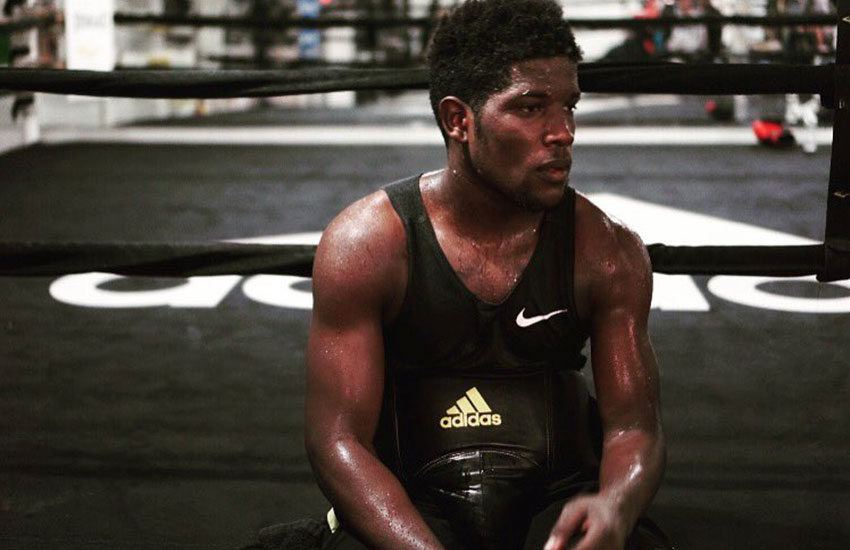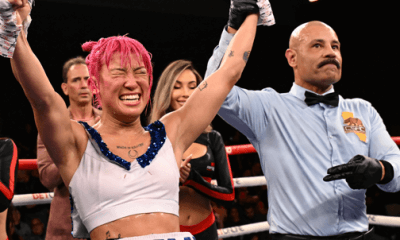Canada and USA
With Title Shot Against Charlo, Lubin Glad He Passed on 2016 Rio Olympics

There are some questions that have no easy answers. Who can say why that chicken crossed the road? But Erickson Lubin, who challenges WBC super welterweight champion Jermell Charlo on Oct. 14 at the Barclays Center in Brooklyn, N.Y., in the kind of early prime-vs.-early prime matchup that almost never happens anymore, is convinced that a bird in the hand is preferable to the proverbial two in the bush.
At least that could prove to be the case for the ultra-confident, supremely talented southpaw from Orlando, Fla.
“Not at all,” Lubin, who turned 22 on Oct. 1, said when asked if he had any regrets for passing on a chance to represent the United States in the 2016 Rio de Janeiro Olympics, where he likely would have been America’s best male hope for winning a gold medal in boxing. “Everything has fallen into place the right way.”
The path not taken by Lubin, who turned pro on his 18th birthday when he signed with the now-defunct Iron Mike Productions (he since has become an important part of Al Haymon’s deep Premier Boxing Champions stable), might have led to Olympic gold, the first such medal for a U.S. male since Andre Ward returned home from Athens, Greece, in 2004 with the prize that previously had sent Cassius Clay (nee Muhammad Ali), Sugar Ray Leonard and Oscar De La Hoya, among others, on their way to professional wealth and fame. Then again, Lubin might have fallen victim to the corruption and incompetence that have plagued amateur boxing at the highest levels for nearly 30 years. It is a gamble more and more highly regarded young U.S. amateurs seem hesitant to take.
What Lubin knows is this: Even had he gone to Rio and mounted the top tier of the medal stand, he would now only be in the formative stages of his pro career, as is the case with U.S. silver medalist Shakur Stevenson (3-0, 1 KO) and bronze medalist Nico Hernandez (3-0, 2 KOs). Instead, he was 14-0 with 12 professional victories inside the distance by the time Olympic boxing in Brazil commenced on Aug. 6 of last year, already on the fast track to his eventual title shot at Charlo (29-0, 14 KOs), who, at 27, is also young enough and good enough to be closer to the beginning of his prime than the back end of it.
In a boxing landscape where “marinating” has become a part of the lexicon, the pairing of two twentysomething growth properties makes Charlo-Erickson not only intriguing but downright delectable, and for many the principal attraction of a Showtime-televised tripleheader, although the purported main event has 34-year-old Cuban Erislandy Lara (24-2-2, 14 KOs) defending his WBA super welterweight title against Terrell Gausha (20-0, 9 KOs). The third featured bout pits IBF junior middleweight champ Jarrett Hurd (20-0, 14 KOs) against former WBA super welterweight ruler Austin Trout (30-3, 17 KOs).
Among the high-level events that might have marinated a bit too long are the 2015 megafight pitting Floyd Mayweather Jr., then 38, and Manny Pacquiao, then 36, a showdown that many believe, with some justification, came along five years past its optimum delivery date. If anything, this early meeting of Charlo and Erickson might be coming before it attains its full box-office potential. Then again, the young and gifted are often impatient, sometimes recklessly so, and Lubin – who lobbied hard for this opportunity – will have to find out for himself if his eagerness to follow in the footsteps of his role model and former promoter, Mike Tyson, is as justified as he believes it to be.
When Lubin was 5-0 as a pro, Tyson – who was just 20 years of age when he became the youngest heavyweight champion in boxing history – explained why his company’s smokin’ hot prospect was already bypassing the traditional, slow-and-steady route to stardom in four- and six-rounders against fellow neophytes and non-threatening journeymen.
“When we matched him up in fights with contemporaries, everyone said that we fought him too soft,” Tyson said in a press release. “There is no competition in four-round or six-round fights for him. The only way to really see him develop and to challenge him is to step him up. That is what he wants. Actually, that is what he demands.”
With apologies to the Rolling Stones, sometimes you can always get what you want. Lubin became the WBC’s top-rated and mandatory contender for Charlo’s 154-pound title when he stopped Mexico’s Jorge Cota in four rounds on March 4, also at the Barclays Center. To his way of thinking, his apprenticeship had lasted long enough and it was time to get on with the business of ascending to the throne he always has believed was his rightful destiny. To hell with that marinating stuff.
“We could have put things off a while longer, I guess, but I said I wanted the WBC belt and I wanted it now,” Lubin said.
“Right from the start, my managers Garry Jonas and Henry Rivalta pushed me real hard, putting me in with veterans and prospects with winning records. They didn’t give me nothin’ easy, but I made it look easy. Fighting the people I did got me into the fight with Cota for the mandatory spot, which some said I was too young for and I had been pushed into too soon.
“Personally, I think I’ve waited too long. I’ve been boxing since I was four years old. Mike Tyson won his first world championship at 20. He dared to be great, and so am I. This is my time to be great. I’m going in there on Oct. 14 to do what I do best, and that’s win.”
Charlo also does not know what it feels like to lose as a pro, and he doesn’t expect to be introduced to the concept of defeat against an opponent who still might be too inexperienced to pose a credible threat.
“He’s a crafty young fighter,” Charlo conceded when asked about Lubin. “He’s strong. He’s got some skills. He’s got a little pop. (But) I’ve knocked out every southpaw I’ve fought.”
Only after the biggest fight of his life ends will Lubin, the son of Haitian parents who immigrated to Florida before he was born, know for sure if his decision not to stick around for the 2016 Olympics was irrefutably correct. Should he lose – and many prognosticators are calling his scrap with Charlo a tossup – the argument again will be raised that he might have been better served by going to Rio and perhaps winning a gold medal before turning pro. At least that was the position taken four years ago by Dr. Charles Butler, the then-president of USA Boxing, who accused Tyson of undermining America’s Olympic efforts by prematurely wooing away the country’s best amateur fighter.
In an open letter to Tyson published in USA Today, Dr. Butler wrote that he was damaging Lubin and other early pro signees offering them “pennies on the dollar for what they would be worth with an Olympic medal, or even being just an Olympian. You are destroying the next United States Olympic boxing team.”
Tyson disputed that assertion, but then too had Hall of Fame trainer Emanuel Steward, who as early as 2002 had warned that the Olympic dream that once had been so appealing to young fighters had lost much of its luster for deficiencies USA Boxing seemed either unwilling or unable to correct.
“Olympic boxing is not what it used to be, and nobody in America is in agreement on what they want to do,” Steward, who was 68 when he died on Oct. 25, 2012, said shortly after he had resigned from the mostly ornamental position of USA Boxing’s director of coaching. “To me, it’s been steadily declining since 1988. I don’t even have my amateur kids today pointing toward the Olympics. When I started coaching in 1961, that was everyone’s dream. Your first thought was trying to go to the Olympics, then you worried about turning pro afterward.”
Lubin admits that the idea of doing enough to win in a particular Olympic bout, and not getting his deserved victory, played into his decision to take Iron Mike Productions’ money. So, too, did the fact that no Olympic boxing matches in 2016 were broadcast on over-the-air NBC, instead being shuffled off to secondary television outlets. More’s the pity, but the days of Olympic success instantly manufacturing American boxing heroes like Leonard and De La Hoya seemingly had already passed.
“I didn’t want to take any more wear and tear in the amateurs,” Lubin said. “I was ready for the pros. I had been getting offers from different promoters since I was, like, 15. I had won every tournament – really, every fight – I had had since I was 13. I thank USA Boxing for everything they did for me, but it was time to move on.”
Having come so far, so fast, he figures there’s still a ways to go yet. Maybe he isn’t all that he can become yet, but where he is ought to be enough to nudge even as capable a fighter as Charlo aside.
“I’m only going to keep getting better,” Lubin continued. “I’m not even in my prime yet, and still I’m taking all these guys out. I can’t wait to show the world just how much better I can get.
“Mark my words, I’m going to make a statement and prove that I’m the best 154-pounder out there. I’m the youngest, the strongest, the fastest. I can mix it up, too. If something isn’t working in the ring, I know how to switch it up real quick.”
Check out more boxing news on video at The Boxing Channel.
-

 Featured Articles4 weeks ago
Featured Articles4 weeks agoThe Hauser Report: Zayas-Garcia, Pacquiao, Usyk, and the NYSAC
-

 Featured Articles3 weeks ago
Featured Articles3 weeks agoOscar Duarte and Regis Prograis Prevail on an Action-Packed Fight Card in Chicago
-

 Featured Articles2 weeks ago
Featured Articles2 weeks agoThe Hauser Report: Cinematic and Literary Notes
-

 Book Review2 weeks ago
Book Review2 weeks agoMark Kriegel’s New Book About Mike Tyson is a Must-Read
-

 Featured Articles4 weeks ago
Featured Articles4 weeks agoRemembering Dwight Muhammad Qawi (1953-2025) and his Triumphant Return to Prison
-

 Featured Articles7 days ago
Featured Articles7 days agoMoses Itauma Continues his Rapid Rise; Steamrolls Dillian Whyte in Riyadh
-

 Featured Articles3 weeks ago
Featured Articles3 weeks agoRahaman Ali (1943-2025)
-

 Featured Articles3 weeks ago
Featured Articles3 weeks agoTop Rank Boxing is in Limbo, but that Hasn’t Benched Robert Garcia’s Up-and-Comers


















